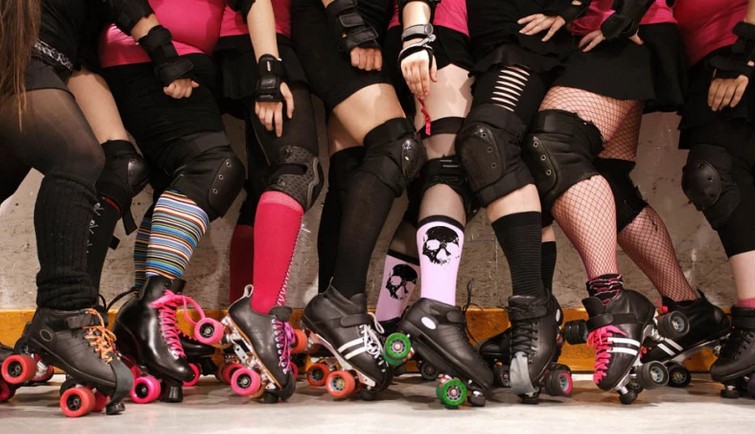This is an edited excerpt in two parts, from Polly Bennett’s PhD Thesis, “Roller derby changed my life” (2020), which explored how radical, athlete-led sport like roller derby, can provide a break from daily experiences of exploitation and constraint. Below some quotes from interviews with roller derby skaters are interspersed with some of the philosophical insights from the thesis.
The full thesis is available: https://awgsa.asn.au/roller-derby-changed-my-life-rethinking-marxist-theory-of-emancipatory-praxis-through-a-case-study-of-womens-flat-track-roller-derby/
For Part One, go to The Love Affair Begins
Part Two: Momentary triumphs of human self-activity
I came to roller derby after many years of participation in activism. This activism involved not only participation in a range of social movements but reading from the classic texts of socialists and radicals. I was particularly interested in the ideas around capitalism’s contribution to human alienation, and our daily resistances to this. My involvement in both boxing and roller derby demonstrated for me, in practice, some of the ways in which we – as human beings and, particularly, as women – fight to reclaim the sense of our inner selves, in action, in our bodies, in concert with others, and against the dominant social systems of constraint.
Skater: Yeah, it definitely changed my life. I like all the stuff, like I said before, learning all those skills, becoming fit, learning about the way people work, I think, has changed my life… the way people work in a group.
For me, sport was not the ‘other’ to social movements – a distraction or, worse, an ‘opiate’[1] – but was absolutely connected to them. CLR James (described in Smith 2011, 2006), whether in his political writings or sports journalism, made this point too: everyday resistances are not the other to social struggle but are at the heart of it.
Whether in sport or creative arts, these attempts at living a full life are at the revolutionary core of movements of change. To understand how change is made, we need to understand and listen to that heart, in all its bloody, messy, beating, biological reality; in the ways it symbolises life; in the way it connects us to each other; in the way it suggests forms of social connection that could be organised for each other in mutual life-giving and across society.
Skater: …ultimately that’s what derby meant to me [as a transgender woman], it was not just acceptance, it was being actively welcomed, being actively acknowledged for who I was and having that celebrated [cries]. There was a great deal of validation and love in that experience, and that for me is what roller derby was [cries].
Raymond Williams (2005) points out that, while the dominant culture appears as the only culture, it is not. There are always resistances to the dominant culture: sometimes remnants of the old and sometimes indicators of future social forms.
My claim is that all acts of resistance are first moves towards self-valorisation. Movements for workers’ self-organisation are often connected simultaneously with movements for self-realisation and fulfilment.
Expressing the self-within
According to historian Andrew Smith (2011: 487), CLR James’ life’s work on sport demonstrates:
The triumph of (taking risk in sport), when it occurs, is that it demonstrates to the watching world for a moment something of the possibility inherent in human creativity, something of the human ability to transfigure and transform circumstance.
Under certain conditions, sport changes lives. Far from being the ‘other’ to social change and freedom, sport, too, can be central. Just as social movements, critical art projects and workers’ self-activity can create a space for resistance to dominant social structures, alienation and their attendant ideologies, so can sporting cultures.
Skater: Well, everything is different now, because I can do whatever I feel I want to do, and I can tell my children ‘you can do whatever you want to do and nobody gets to tell you who you are, and nobody gets to tell you you’re a girl so you have to wear a skirt, or you’re this so you have to do that’…I’m totally much more aware [that] everyone makes choices and you don’t get to choose for other people.
This is important. As Bentley Le Baron (1971: 561; own emphasis) notes, the struggle for emancipation is never solely about directly changing those social structures, it is also about ‘the self-activity of becoming other than we are, the activity of surpassing the given (which is ourselves), and of beginning to be new people, creating new kinds of social relations’.
When the physical activities of the bodies who are oppressed and discriminated-against are put under their own control, these practices have the potential to become radical. As queer disability activist and radical poet, Jax Jacki Brown (2017), puts it, ‘my body holds the secrets to the revolution’. Those who live in particular bodies know best how cultural practices impacting upon these particular bodies must change.
Control by those who are most impacted by social practices is essential to any emancipatory change. In this case study, this has meant the sport being ‘by the skater for the skater’. Such a principle is more broadly relevant though.
Skater: So, being that in control of your body, and being able to use your body in that way, is really empowering. I think that’s probably the main [reason]… that roller derby saved my soul, or roller derby changed my life.
Boxer and journalist Mischa Merz (2012, Preface) explains that she practices the sport of boxing ‘like an artist, because I must, not to attain any particular goal, but because it is who I am’. In these ways, sport displays, in a sense, that dynamism of living labour that Karl Marx argued drives human development and directs it towards emancipation. Dave Zirin (2008: xii; own emphasis) surmises that:
… sports are more than just a sounding board for war, graft, and mind-numbing moralism. It can also be a place of inspiration that doesn’t transcend the political but becomes the political, a place where we see our own dreams and aspirations played out in dynamic Technicolor.
Skater: So yeah, it is empowering, because it is supportive and inclusive, because you’re using your body for this amazing sport, because you’re learning new things about your body all the time, you’re pushing yourself all the time, you’re achieving things all the time that you may have never dreamt that you could achieve before.
The words of roller derby skaters call on us to listen: to our bodies, to ourselves, to each other, to the life within us, together and reciprocally. They call on us to make change now, to express our humanity, to step, ever-so-briefly but also boldly outside of systems of alienation and control. They call on us to break free and express ourselves in our full corporeality. They show that, to take that step, is not only desirable but possible – sometimes, under some conditions, with the support of some others.
That ‘something about roller derby skaters’ that some talk about is more than a rejection of dominant femininity and the constraints it imposes upon person and body. ‘That something’ is also a reflection of a more universal rejection of oppressive imposition: rejection of constraining ideology that works to maintain our alienating social systems. One skater describes it as ‘that fuck you’ attitude.
That attitude is simultaneously a rejection of constraint and a reassertion of the self-within. This self-within is not some individualised mechanical-like body, it is embodied and living and connected to others: not in Borg-like[2] monotony, either, but in creative mutual self-expression, with and alongside others in freedom.
… she (the coach) would yell things like: ‘dominate the space’ and ‘get in there, dominate the pace’. And I said to her, ‘I’ve been trained by my parents to not do those things, to be a good girl’, you know, so that’s what was freeing and to be actually allowed to… go ‘yeah, my space, bugger off!’, to act defensively to stop people… to have the freedom and the permission… The nature of the sport made it, like, freeing for me personally.
A radical practice such as roller derby then, in the philosophical sense, is a kind of looking forward, beyond now to maybe when. It is a complex and contradictory mix of commentary on femininity and its constraints in the past, now and as a harbinger of possible futures. These futures are where the binary of masculine and feminine, of man and woman, return to their more material reality: a reality which is neither binary nor the same but is a diverse and complex mix of bodies formed, socialised and, always that little bit, resistant to constraint.
Another question appears, then: how possible is this ‘beyond’? Again, this a question only answered in movement. It is neither yes nor no. It is in the everyday acts of resistance, of listening to the inner self, of communion, of free physicality, of tending to our bodies, of being both for ourselves and each other towards mutual flourishing.
Sport shows nothing more and nothing less than the ability of human beings to move in the world and to change it and ourselves. It cracks open into view – or into feeling and experience – the potentials for a world where those fleeting moments of freedom and flourishing that occur in resistance to our current social conditions might instead form the foundation of our social conditions.
[1] A play on Marx’s (1844b: 234) description of religion, but see my remarks in chapter 7.
[2] The Borg are a Star Trek representative, in alien form, of what rigid and dictatorial collective practices may sometimes look like. Some argue they are a caricature of the old ‘Communist’ regimes.
References
(To follow)

ABOUT THE AUTHOR
Polly Lisa Bennett (they/them) is a researcher and sociologist, with a passion for social justice. They also write creative non-fiction. Their writing is usually semi-autobiographical or in current affairs. They are published in Overland journal. Polly’s recent research has involved working with LGBTIQA+ people, particularly those who are young or with disability, to improve health, education and community services for themselves and their communities. In 2021 Polly completed a PhD thesis exploring, what is it about roller derby that changes skaters’ lives? Polly lives on unceded Waddawurrung Country (Geelong) and contributes to Pay the Rent.


Leave a Reply